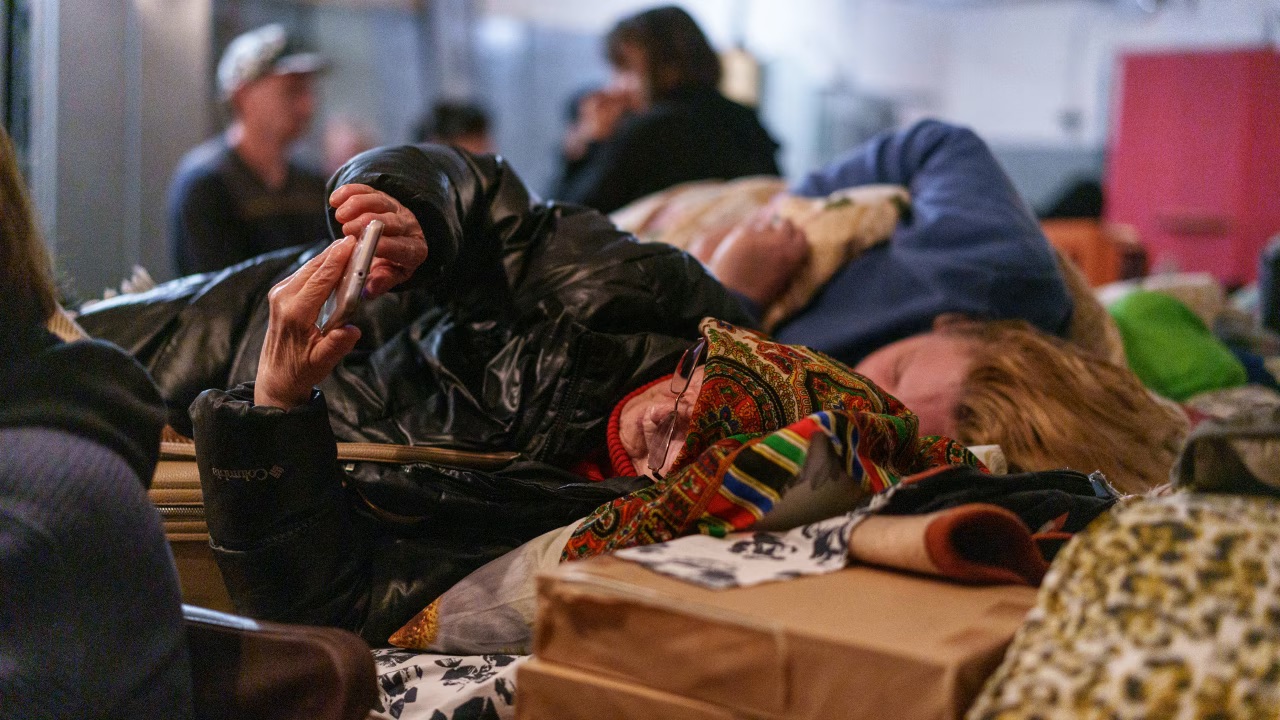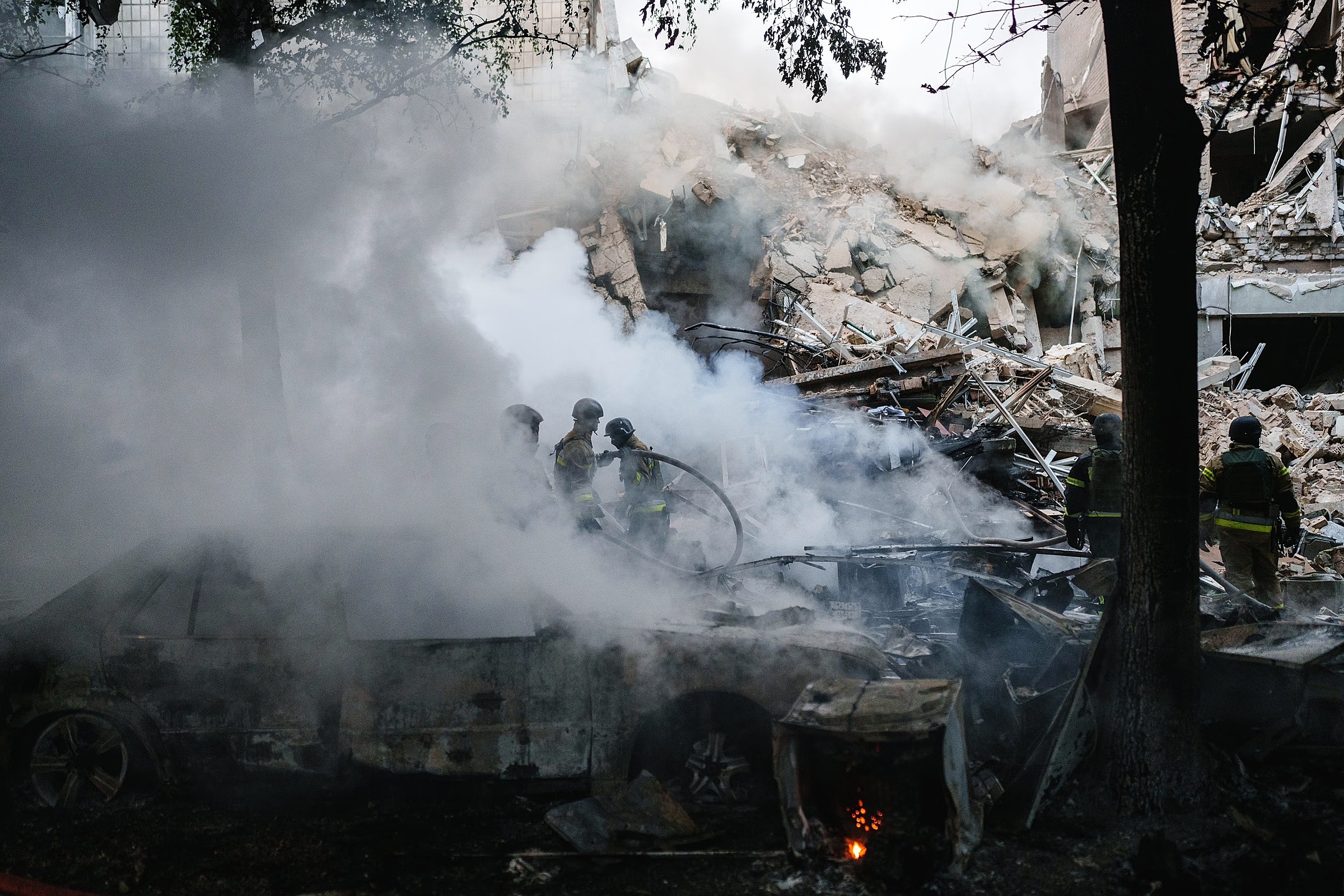On 16/6, residents of Kyiv, the capital of Ukraine, enjoyed a warm evening. The air was filled with the sweet scent of grass, and outdoor cafes bustled with activity. There was no sign that this was a city in a country at war.
But the peace was short-lived. A warning appeared on social media soon after, stating that several Russian suicide drones (UAVs) were approaching.
A few suicide UAVs weren't enough to make Jane Lytvynenko, a WSJ reporter in Kyiv, change her dinner plans. But throughout the meal, Lytvynenko kept her phone open to stay updated on any attack alerts.
At 9:06 PM, air raid sirens blared across the city as Lytvynenko strolled after dinner, indicating UAVs had entered Kyiv's airspace. However, the residents of the Ukrainian capital remained calm. Lytvynenko then returned home for a short nap to prepare for the peak of the attack.
 |
A woman checks her phone in a bomb shelter in Kyiv, Ukraine on 17/6. Photo: WSJ |
A woman checks her phone in a bomb shelter in Kyiv, Ukraine on 17/6. Photo: WSJ
At her apartment, Lytvynenko began her preparations. She charged all her electronic devices and checked her personal emergency bag, which contained water, granola bars, a medical kit, a flashlight, a portable charger, and a few sweaters. Warm sweatpants and socks were also folded in case she needed to go to the bomb shelter.
Her bathtub was currently the safest place in her apartment, as it was located away from the windows and behind an interior wall. She had placed blankets and pillows in the tub for comfort.
Attack monitoring channels reported that the UAVs were far enough away for her to get some sleep before the air raid began. "I set my alarm to maximum volume to ensure I didn't miss the air raid warning and set 20-minute alarms to wake up and check on the attack," she recounted.
The next update came at 10:31 PM, announcing that 100 UAVs had entered Ukrainian airspace.
"Just after midnight, I heard the UAVs. The engine noise grew closer. I rushed to the bathtub and heard the UAV accelerate, a sign it was heading towards its target. But the engine noise continued, and it flew past my apartment. I checked my phone and learned more UAVs were incoming. It was time to go to the shelter," Lytvynenko said.
A crowd gathered at the shelter entrance as usual. They chatted and checked their phones, ready to run down at the first sound.
"They're here, aren't they? When we arrived, everything was quiet," one woman remarked, referring to the UAVs.
This shelter was built during the Cold War. Many people brought their pets. The cold underground space transformed into a living room for dozens of people. A blonde woman slept next to her beagle. A boy with a parrot ate a sandwich with his friend while their parents scrolled through their phones.
An update arrived after 12:30 AM. Everyone focused on their phones. The information revealed dozens of UAVs circling over Kyiv and Russian bombers carrying cruise missiles taking off from their base.
"By 2 AM, we'll know if they've launched missiles. While following the updates, everyone calculates the missile arrival time and the crazy question of where they'll target," Lytvynenko shared.
"Was that a ballistic missile?" people exclaimed as the walls shook.
 |
Smoke rises from debris after an airstrike in Kyiv on 17/6. Photo: WSJ |
Smoke rises from debris after an airstrike in Kyiv on 17/6. Photo: WSJ
Every explosion, even if it was a Ukrainian air defense interception, shook the shelter. Those who were sleeping woke up. Only the American-made Patriot defense system could counter ballistic missiles, but Ukraine lacked this weapon.
"A missile strike on Solomyanka, a working-class area of Kyiv," a man announced.
Lytvynenko informed those around her, "Ambulances have been called," based on the updates on her phone.
The woman with the beagle asked, "How many missiles can a Russian Tu-160 bomber carry?" Lytvynenko replied, "6-12."
"Oh my God," the woman cried.
At 2:15 AM, people in the shelter continued scrolling through their phones and sharing information about the attacked area. Exclamations of "Oh my God" echoed repeatedly.
Another wave of UAV attacks came an hour later, but some people started leaving the shelter.
"Is the attack over?" a woman asked. "No, people are just tired," her friend replied.
By 4:30 AM, Lytvynenko felt the cold seeping through her sweater. Sleepiness overcame fear. She decided to go home, even though about 15 UAVs were still in the sky.
Images of the night's air raid began circulating on social media. Many buildings were damaged and destroyed.
"Fires burned across the capital. The smell of smoke filled the air. The authorities advised people to close their windows and stay indoors," Lytvynenko reported.
Grief enveloped Kyiv. The bustling streets of the previous evening now witnessed the pain of war. Twenty-eight people were killed and more than 140 injured during that night of missile rain and UAVs in Kyiv.
Thuy Lam (Via WSJ)












